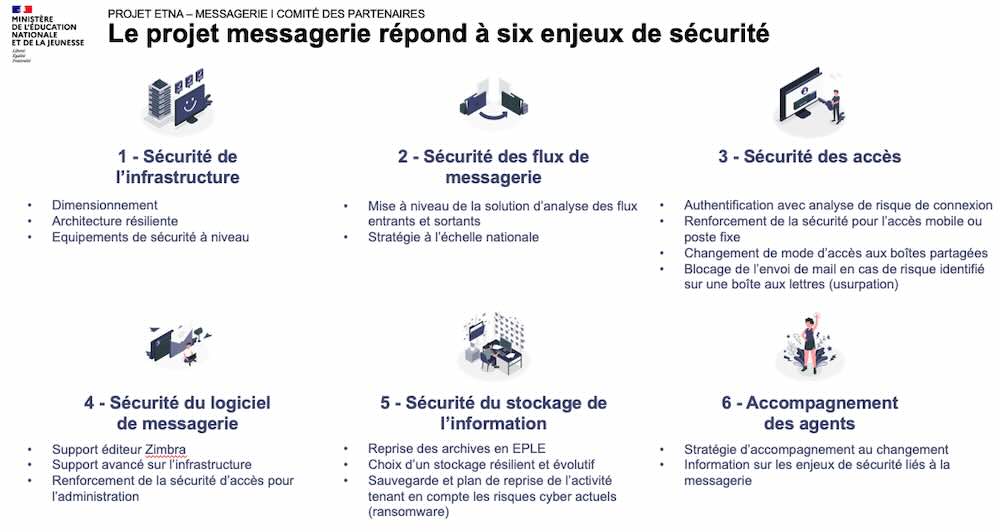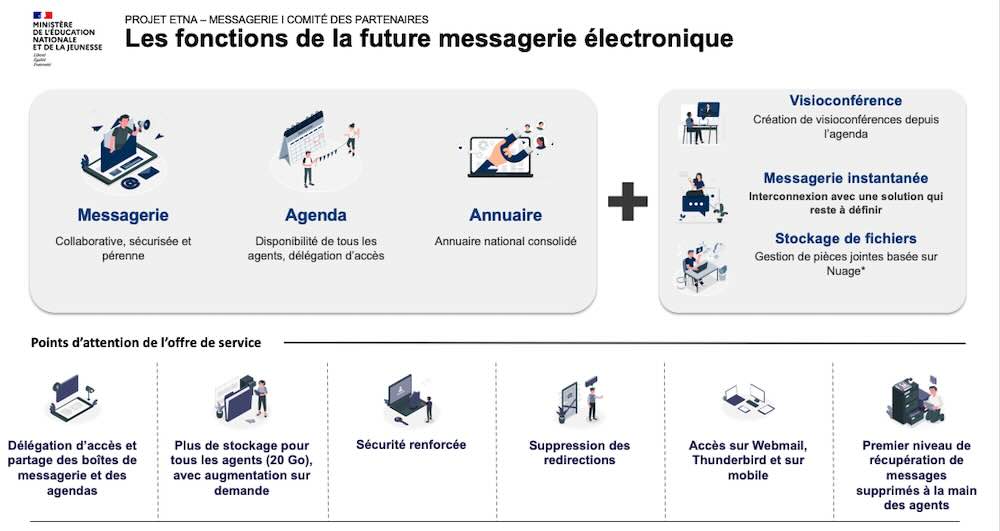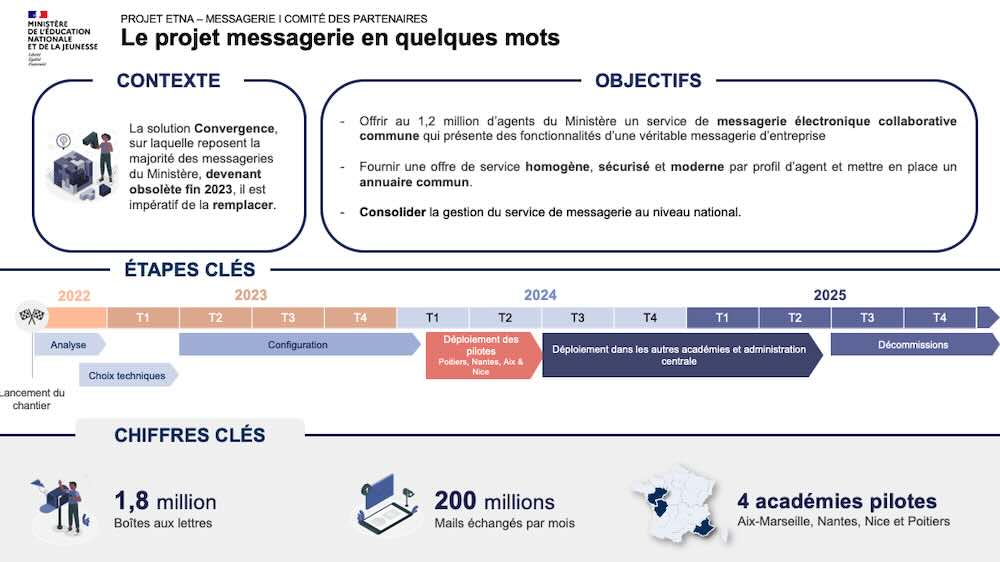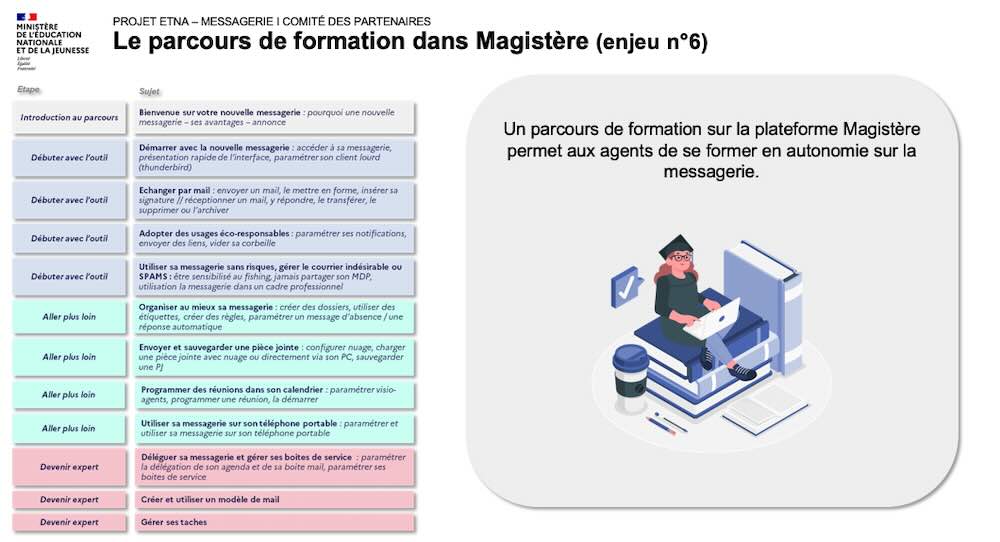The messaging system of the National Education was deployed and massively implemented in 2001 in each of the academies; since then, the world has undergone some changes, and it was necessary to adapt. The introduction of the new messaging system is part of the ETNA program, aimed at modernizing the digital work environment of agents.
It is with Laurent Le Prieur, Deputy Director of the Digital Base Office at the DNE, that we detail the many advantages of this new, much more « collaborative » service.
« Since 2021, the Digital Base sub-directorate of the Directorate of Digital for Education has been leading a vast program called ETNA (Digital Work Environment for Agents), which aims to rethink the digital daily life and notably the following themes: communication and collaboration services and tools, workstation management, smartphones or tablets, collective equipment particularly in meeting rooms such as video conferencing equipment, the deployment of a universal WIFI service (Eduroam), or even the renovation of identity management, etc. » explains Laurent Le Prieur.
This vast project includes, for example, the provision of the video-agent solution based on the open-source software BigBlueButton (see our article on this subject), but also document storage with the « Nuage » solution, video sharing with Peertube, etc.
The new collaborative messaging system arrives in this evolving context and is one of the pillars of the ETNA program.
Why a new messaging system? Challenges and objectives
Laurent Le Prieur explains the three challenges in the construction and renovation of this new messaging system:
« Ensuring that the new solution provides alignment with usage, a level of functionality and service in line with the standards accepted on the internet and those proposed by the GAFAM notably; Ensuring an increase in the security level of the new service compared to the existing one, as we must provide the best in this field, as messaging remains the primary vector of attack to undermine an organization; Intensifying efforts on setting up support for the transition and adoption of the new service by agents so that they can understand and take ownership of the new service.«

He further adds that it is now necessary to provide a solution that is in line with the new organizations, such as the academic regions, for example.
« In the eight regions concerned, messaging and calendar solutions have been deployed at the academy level, and consequently, the regional dimension for coordinating actors is not possible with the old solution. » he explains.
Since the start of the school year in 2022, teams from the DNE, national teams, and experts from the academies have been working to develop this new solution and upgrade the 1.8 million mailboxes, including the 1.2 million mailboxes of National Education agents. This new project concerns, in fact, half of the state civil service agents.
Currently, there are 200 million emails exchanged per month, and considering the number of users, this project is the largest collaborative messaging project in Europe for an organization (excluding the use of GAFAM services)! It is a sovereign messaging system, hosted and fully operated by National Education agents.
Enhancement of Messaging Service Quality

Each agent will now be offered 20 GB of storage.
« For comparison, Google’s free offer is 15 GB » Laurent Le Prieur points out.
« Clearly, this could have, in the past, restricted agents in their usage, and many teachers have turned away from academic messaging because there was not enough storage. » he notes.
« This messaging will be consolidated nationally around a single platform, so the benefit is that all agents will be in a single directory with their calendars that can be synchronized. » he adds. This leads to smoother exchanges, and the term « collaborative » takes on its full meaning.
When an agent wants to organize a meeting, they will be able to insert a video conference participation link with just one click, without any further effort.
The question of a « lifetime » address is also raised in the specifications, « to improve the fluidity of agents’ professional paths. » In any case, even if this issue has not yet been decided, what is certain is that agents will retain all the history of their messaging data, « even in the case where the agent moves within the National Education system and their email address changes » Laurent Le Prieur specifies.
« Providing a national solution also makes it easier for agents to adopt this solution; they do not have to relearn a new environment with each mobility, as is currently the case. » he adds.
Pilot Academies before Project Rollout
The PACA academic region (Aix-Marseille and Nice) and the two academies of Nantes and Poitiers are participating in the pilot phase, representing over 200,000 email accounts.

The messaging system is currently being deployed to the agents of the four Information Systems Directorates (DSI) of the pilot academies concerned, « then each academy will organize the phased deployment of the new solution to the various user communities. » he explains.
The four pilot academies are fully committed to addressing the issue of agent support or the assistance chain. Documents, videos facilitating the adoption of the service are already available. Also noteworthy is the development of a Magistère course, for example.

« The idea is that the following academies do not have to recreate a support or communication kit, as this will be created and improved during the pilot phase in collaboration with the relevant academies. » explains Laurent Le Prieur.
The use of the new messaging solution is planned to begin in May-June for the first users of these 4 pilot academies, with allocation by batch of agents according to their specialty; deployment will continue until the fall before embarking with all other academies on a generalized deployment for all agents by the end of 2024 and throughout 2025.








